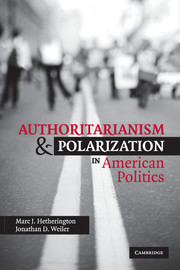Book contents
- Frontmatter
- Contents
- Acknowledgments
- 1 Spanking or Time Out: A Clash of Worldviews?
- 2 Putting Polarization in Perspective
- 3 Authoritarianism and Nonauthoritarianism: Concepts and Measures
- 4 A Historical Account of the Roots of Worldview Evolution
- 5 Authoritarianism's Structuring of Contemporary Issues
- 6 Threat and Authoritarianism: Polarization or Convergence
- 7 Evidence of Worldview Evolution
- 8 Immigration: A Reinforcing Cleavage that Now Constrains the Republican Party (GOP)
- 9 What the 2008 Democratic Nomination Struggle Reveals about Party Polarization
- 10 A New View of Polarization
- Epilogue
- Bibliography
- Index
4 - A Historical Account of the Roots of Worldview Evolution
Published online by Cambridge University Press: 05 June 2012
- Frontmatter
- Contents
- Acknowledgments
- 1 Spanking or Time Out: A Clash of Worldviews?
- 2 Putting Polarization in Perspective
- 3 Authoritarianism and Nonauthoritarianism: Concepts and Measures
- 4 A Historical Account of the Roots of Worldview Evolution
- 5 Authoritarianism's Structuring of Contemporary Issues
- 6 Threat and Authoritarianism: Polarization or Convergence
- 7 Evidence of Worldview Evolution
- 8 Immigration: A Reinforcing Cleavage that Now Constrains the Republican Party (GOP)
- 9 What the 2008 Democratic Nomination Struggle Reveals about Party Polarization
- 10 A New View of Polarization
- Epilogue
- Bibliography
- Index
Summary
In the previous chapter, we discussed in some detail the attributes of both the more and less authoritarian. An important insight of our work is that authoritarianism is important in explaining political change in America, not only, or even primarily, because of authoritarians themselves. Rather, we believe that the increasingly politicized worldview of less authoritarian and nonauthoritarian voters, which has occurred in response to the use of issues like race, gay rights, and the war on terror by conservatives to attract more authoritarian voters, explains much of the recent rise of authoritarianism in defining political conflict.
In an effort to change an electoral playing field that Democrats had dominated since the 1930s, Republican elites and the allied movements of what became known as the New Right and their subsequent offshoots played a pivotal role in bringing these hot-button issues to the fore. In the process, they shaped a political environment in which emotionally laden, symbolic concerns – what Richard Nixon and his advisors originally termed positive polarization (Carter 1996) – assumed particular importance to political conflict and, as it happens, made authoritarianism central to understanding that conflict.
In thinking about the historical roots of the current political divide we have drawn upon Carmines and Stimson's (1989) notion of issue evolution. They saw important changes in the nature of American political party competition as rooted in a single issue – race – and the power of that issue to restructure American politics beginning in the 1960s.
- Type
- Chapter
- Information
- Authoritarianism and Polarization in American Politics , pp. 63 - 84Publisher: Cambridge University PressPrint publication year: 2009



